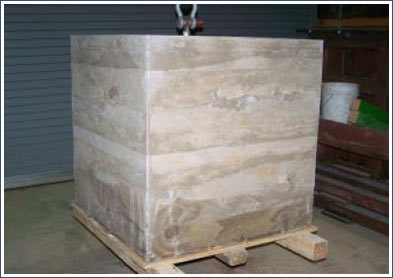Polymer concrete: concrete solution
Scientists have studied creating a new type of concrete to replace conventional concrete using Portland cement: Polymer concrete . This concrete not only reduces greenhouse gases but also increases the durability of construction works many times.
Concrete is the most common construction material on our planet. Currently, about 5-8% of man-made CO 2 comes from the industry that produces Portland cement, an indispensable adhesive of conventional concrete.
Portland cement is one of the most widely produced materials on Earth. Worldwide production of Portland cement now exceeds the threshold of 2.6 billion tons a year and an average annual increase of 5%.
To be able to curb the rate of pollution has reached the level of warning as today, TS.Erez Allouche , tutor in the field of public works design and construction at Louisiana University of Technology (USA) and Vice President of Trenchless Technology Center is conducting an innovative research project on calf polymer (geopolymer), using by-products from coal-fired power plants.

The ' green ' cement study has created a new polymer concrete technology.This is a cement block 5000lb (453.6 grams = 1lbs) using 'fly ash'.
This synthetic polymer type uses adhesives to take advantage of ' fly ash ' (fine waste obtained from burning coal dust in thermal power plants, the main component is silicon, aluminum oxide, iron, calcium, magnesium and sulfur There is also an amount of unburnt coal, not exceeding 6% of fly ash mass - an extremely abundant industrial byproduct - as a substitute for Portland cement .
Polymer concrete has many advantages compared to conventional concrete. First of all, it's basically capable of ' limiting ' CO 2 emissions and can create a usable infrastructure over hundreds of years . And by taking advantage of ' fly ash ' (fly ash), it can free up a large area of land currently used as a store of coal products that easily burns and protects our water from being contaminated by fly ash.
Compared with conventional Portland cement (OPC), polymer concrete (GPC) has many better features (corrosion resistance, heat resistance (up to 2400oF), compression resistance and tensile strength, shrinkage . ).
The researchers said that the biggest advantage of polymer concrete is its ability to reduce greenhouse gas emissions, about 90% when compared to OPC.
This technology is being promoted to reduce energy demand in the future. It will receive special attention at the Louisiana Energy Technology Systems Conference next month at the Technology Transfer Center in Shreveport (Los Angeles, USA).
- The new solution uses sparks to recycle concrete
- The road itself absorbs 4,000 liters of flooded water in a minute
- Scientists have successfully developed a new type of concrete that is less prone to cracking than conventional concrete
- Concrete is devastatingly natural as much as plastic waste
- Story of concrete - king of construction materials
- Producing concrete from ... industrial sludge
- 2 Vietnamese original engineers invented extremely safe automatic deicing concrete
- CO2 remedies have both reduced emissions and generated trillions of dollars
- Develop new mixed concrete from thermal power industry waste
- Self-adhesive concrete
- Concrete bending - this kind of material can create revolution in the construction industry
- He tested the self-healing concrete potholes
 Is the magnetic North Pole shift dangerous to humanity?
Is the magnetic North Pole shift dangerous to humanity? Washington legalizes the recycling of human bodies into fertilizer
Washington legalizes the recycling of human bodies into fertilizer Lightning stone - the mysterious guest
Lightning stone - the mysterious guest Stunned by the mysterious sunset, strange appearance
Stunned by the mysterious sunset, strange appearance